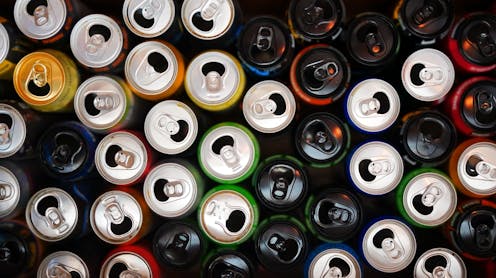
The Labour party has committed to ban the sale of energy drinks, such as Red Bull and Monster, to under-16s should they win the general election on July 4.
So far, the election campaign has been light on proposals to address the pressing issues facing our food systems, so the news that the Labour party will take action on junk food advertising and ban the sale of energy drinks to young people is welcomed.
Energy drinks contain large amounts of caffeine and sugar and offer no nutritional role in children’s diets. They are also harmful to their mental and physical health and hinder learning.
Around 790 million litres of energy drinks are consumed in Britain each year, and young people are the main consumers.
Under Labour’s proposal, energy drinks containing over 150mg of caffeine per litre will be banned.
In a previous study, my colleagues and I found that young people in England living in poorer areas are drinking more energy drinks while numbers of young people consuming these drinks in wealthier communities are falling.
We used data from 2,587 young people who took part in the National Diet and Nutrition Survey between 2008 and 2016. They ranged in age from 11 to 18 years. Each participant completed a food diary detailing what and how much they ate and drank on four consecutive days.
Health inequality
The results revealed a picture of widening inequality between the richest and poorest families in the UK. It also highlighted growing health concerns for young people experiencing socioeconomic disadvantage.
Notably, we found that every extra £1,000 in household income was associated with being 2% less likely to consume energy drinks. Higher energy drink consumption was also associated with poorer dietary quality, higher energy intake and greater body mass.
Given our findings and the existing evidence, I urge Labour to go further and issue a ban that includes all people under 18 years of age, especially as 16- to 18-year-olds were the biggest consumers of energy drinks in our study.
While some schools and major retailers have previously imposed voluntary bans on the sale of energy drinks to under 16s, data from our research suggests many young people do not think these voluntary bans work.
Young people told us that voluntary bans in supermarket chains and schools are not implemented or enforced effectively. Also, most smaller convenience stores continue to sell these products to children and young people so a ban across all food outlets is needed. Particularly because more deprived neighbourhoods have higher concentrations of convenience stores and takeaways, and these outlets offer fewer healthier choices.
Raising the proposed ban to 18 years of age would align limits on the sale of energy drinks with the established legislation for smoking and drinking. This approach would provide a clearer message to the public that these drinks are not suitable for children or adolescents and make law enforcement easier and more effective.
For the proposed legislation to be most effective, other actions should be considered, including minimum pricing of energy drinks and positioning them in restricted areas of retail and takeaway outlets.
The young people in our study told us that cheaper own-brand energy drinks were often as appealing as the branded varieties because of the quantity that could be purchased within their limited budgets. They also suggested that placing energy drinks behind counters with tobacco and some alcohol products would indicate a health warning and make them less accessible to young people.
If these additional strategies were combined with a ban on advertising of all energy drinks, warning labels and a communications campaign, the public would hear clear messages about the harmful effects of energy drinks.
Scientific evidence indicates serious harmful effects of energy drinks on the heart. Worryingly, these effects occur independently of caffeine, possibly caused by the additional energy-boosting substances such as taurine, guarana and sugar.
Overuse of energy drinks has caused sudden cardiac death, poor mental health and hinders academic performance. These risks need to be appropriately communicated to young people and their families.
Implementing this policy in its current form is a positive step towards supporting all under-16s to consume fewer energy drinks. It is also likely to help curb intake and improve the educational and health outcomes of children and young people from disadvantaged backgrounds who can most benefit.
Going further with a full ban for under-18s, restricting the marketing of these drinks and pricing them to be less affordable for young people will offer maximum protection. The election in July provides an opportunity for political parties to put forward bold and evidence-informed food policies that will help to improve the diets and health of British children and young people.
Christina Vogel has received research funding from the UK National Institute for Health and Care Research (NIHR) and has a non-financial research collaboration with a UK supermarket chain.
This article was originally published on The Conversation. Read the original article.







